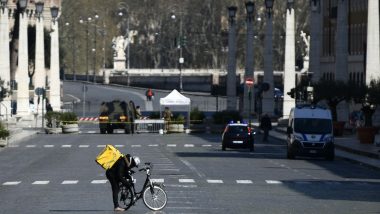Soave March 23: In its most far-reaching measures to stop the spread of coronavirus, Italy is slowing industrial production nationwide, while the hardest-hit region of Lombardy banned any outdoor exercise not on personal property and set distance limits on dog-walking.
Franco Locatelli, president of Italy's Higher Health Council, said on Sunday that with the new stringent measures announced this weekend, Italy had exhausted all the possible ways it could to limit personal and professional contact. Coronavirus Vaccine: Scientists Identify 69 Drugs That 'May be' Effective in Treating COVID-19 Patients, List Here.
That came as Italy announced that the increase in both infections and deaths had showed the first sign of narrowing in the previous 24 hours.
"Let's continue to keep social distance,'' Locatelli said. "Let's adopt these measures, let's manage our behaviour and... certainly we will get the results we are hoping for.''
For most people, the new coronavirus causes only mild or moderate symptoms, such as fever or coughing. For some, especially older adults and people with existing health problems, it can cause more severe illness, including pneumonia.
More than 95,000 people have recovered, mostly in China. After a week of complaining that too many people were still out and about in Lombardy, authorities in the hardest-hit region with nearly half of Italy's cases and two-thirds of deaths issued the clearest measures yet to close loopholes being leveraged circumvent bans on movement.
As of Sunday, the maximum radius for dog walking was set at 200 meters, and all outdoor sport that cannot be practised at home was banned — not because sports posed a threat, but because people were abusing the freedom of movement. Authorities in Lombardy also raised fines for violators to 5,000 euros.
The Lombardy moves came just ahead of new measures announced by Premier Giuseppe Conte to slow industrial production in eurozone's third-largest economy and a major exporter to only sectors deemed crucial.
The government on Sunday was still drawing up a list for the slowdown, set to take effect early in the week.
Locatelli urged anyone whose job would be idled by the new measures to not travel to their hometowns, or risk spreading contagion. He also called on the more than 23,700 Italians with the virus and who were isolated at home to steer clear of family members as outlined by the health ministry, to keep the virus in check.
Italy first moved to prevent the virus from arriving in the country by signing an order on January 31 shutting down flights to and from China. A day earlier, authorities confirmed that a pair of tourists from Wuhan had tested positive in Rome. Both have since recovered.
But it wasn't until February 21 that the first case of locally transmitted COVID-19 was confirmed, in the town of Codogno, southeast of Milan. The town and 10 others, with a total population of 50,000, were immediately isolated.
On Sunday, Rome Police Chief Franco Gabrielli said 80 people had been cited a day earlier -- including for shopping 10 kilometers (six miles) from home, travelling 15 kilometers to a doctor's appointment and claiming medical reasons for being out for a walk but lacking a doctor's certification.
(The above story is verified and authored by Press Trust of India (PTI) staff. PTI, India’s premier news agency, employs more than 400 journalists and 500 stringers to cover almost every district and small town in India.. The views appearing in the above post do not reflect the opinions of LatestLY)













 Quickly
Quickly













